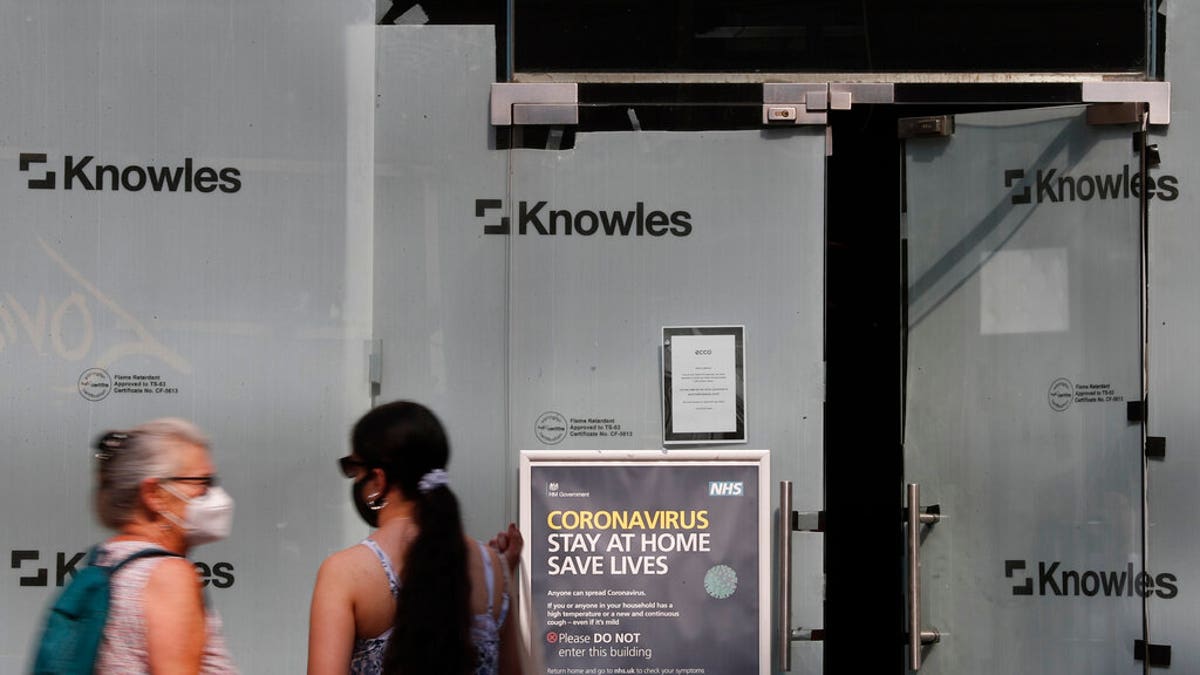The U.K. economy has officially plummeted into recession after official figures announced Wednesday showed a stunning 20.4% drop in the second quarter of the year – the biggest drop since quarterly records began in 1955.
The recession is the deepest coronavirus-related drop among the top leading industrial economies and followed a 2.2% contraction in the first three months of the year. It's the country's first recession in 11 years.
UK FRANCE AGREE TO PLAN TO STOP ILLEGAL IMMIGRANT BOATS ACROSS ENGLISH CHANNEL
The government’s Office for National Statistics (ONS) reported record quarterly falls between April and June in services, production and construction output, and a drop in private consumption by 23.1 percent – which accounted for more than 70 percent of the GDP drop.
It means that GDP is as low as it was in 2003, wiping out 17 years of growth. According to the Times of London, Italy’s economy shrank 12.4 percent, France 13.8 percent, Germany 10.1 percent and the U.S. 9.5 percent.
The U.K. implemented strict lockdown measures near the end of March in order to combat the coronavirus pandemic, shuttering the country’s economy for months, although it has been accused of taking too long to lock down.
“I’ve said before that hard times were ahead, and today’s figures confirm that hard times are here," Chancellor of the Exchequer Rishi Sunak said. “Hundreds of thousands of people have already lost their jobs, and sadly in the coming months many more will.”
However, he said there were “promising signs” from the numbers, citing 8.7 percent growth in the month of June, despite the overall contraction.
“There’s still work to do and even as we recover many people are going to lose their jobs, already have lost their jobs, and we need to make sure that we are constantly focused on providing new opportunities for those people,” he said.
The U.K. has had more than 45,000 deaths attributed to the virus, and is slowly going through stages of reopening – although it has activated local lockdowns in areas where there have been spikes in cases. Prime Minister Boris Johnson, who was hospitalized with the virus, has said he aims for a “return to normality” by Christmas.

Two women stand outside a closed branch of a shoe shop in Kensington, London, Wednesday, Aug. 12, 2020. (AP Photo/Alastair Grant)
As part of that return, pubs and restaurants have reopened, with further parts of the economy set to reopen in the coming months. Schools are eyed for a full in-person reopening next month.
Meanwhile, the government will be hoping that its Coronavirus Job Retention Scheme – that has seen the government pay a significant amount of the salaries of 9.6 million workers in order to keep them on the payroll – will help contribute to a quick and sharp recovery as the country reopens.
CLICK HERE TO GET THE FOX NEWS APP
The U.K. is set to complete its departure from the European Union at the end of the year. It formally left the bloc in January and moved into a transition period, during which there have been negotiations for a trade deal with E.U. leaders.
While critics of the departure say that it adds further economic uncertainty, Brexiteers will hope that the freedom from E.U. regulation may stoke further economic growth and recovery. The government has said repeatedly that it does not intend to ask for an extension to the transition period.
The Associated Press contributed to this report.









































